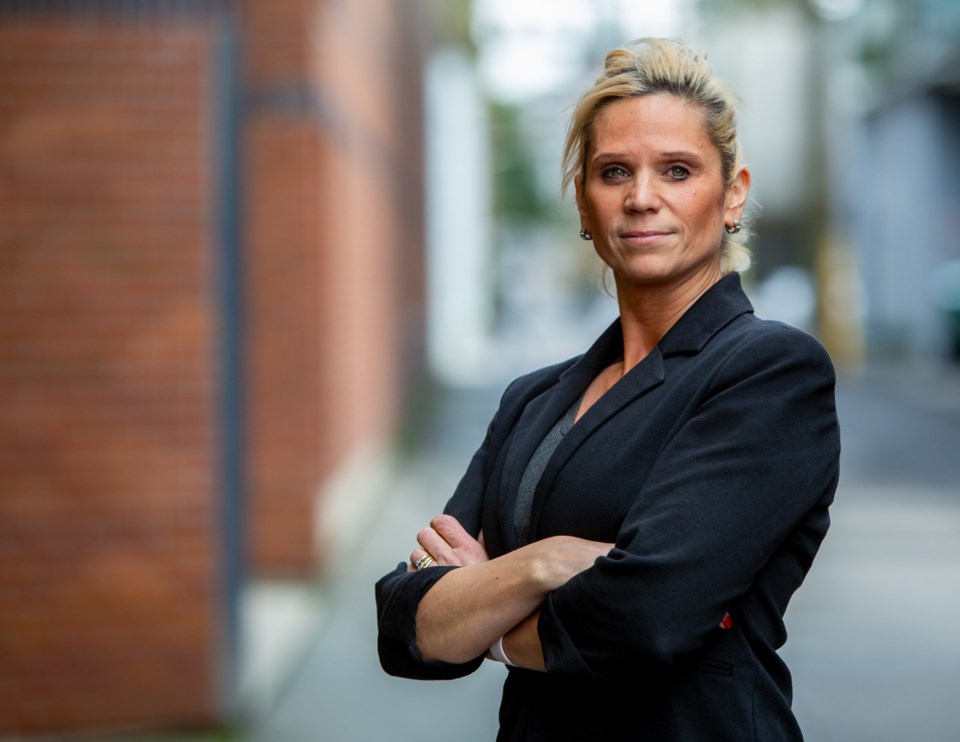The Vancouver Police Department has launched a campaign aimed at reducing the number of sexual assaults by way of educating citizens what “consent” means when two people consider having a sexual encounter.
The message police want made clear is that any form of sexual contact without consent is sexual assault — a message Sgt. Cara Adams said needs to be emphasized particularly among young people.
“The majority of sex assault files really are based on problems with consent,” said Adams, who spearheaded the campaign, which includes social media videos and detailed information about consent posted on the
Posters in nightclub washrooms are also being considered.
The “consent matters” campaign was triggered by what Adams was learning in 2021 as a member of the department’s sex crimes unit. At the time, she said, she started to hear increasingly that youth and young adults didn't have a proper understanding of what consent means.
She highlighted one case of a young victim of a sexual assault, whose peers later came forward and said they were confused about the definition of consent.
“It wasn't just young girls, it was also young boys saying, ‘You know, I'm really not sure what consent means exactly,’” said Adams, noting questions included how long does consent last, can it be revoked, does agreeing once mean it’s yes all the time.
“So I really felt that with questions like that, we had to get the messaging out.”

'Communicating openly and honestly with your partner'
Adams, who now works in the department’s counter exploitation unit, said there's no real broad-based sex education for these difficult questions, and that young people typically don't go to adults to get answers.
Rather, they tend to seek answers from their peers who often are also pretty confused about it, she said, emphasizing while the goal of the campaign is to reduce sexual assaults, it is also meant to educate people who have questions about consent.
Consent — as a definition explains on the VPD website — is about “communicating openly and honestly with your partner(s) about what you’re comfortable with and what you’re not, and respecting each other’s decisions and boundaries.”
Also: “You have the right to decide if you want to have sex or not. You can agree to some types of sexual contact, like kissing or touching, and not others. You can say yes and then change your mind at any time.”
Snapchat, Instagram, TikTok
In one of the campaign videos, which are being posted to Snapchat, Instagram and TikTok, four young people are seated in a school cafeteria.
Male: “Did you all hear about Dev and Ashley?”
Female: “What about them?”
Male: “Ashley told my sister that Dev forced himself on her.”
Second female: “Oh my God…”
Male: “Dev said she was up for it and out of nowhere she changed her mind.”
Second male: “So why didn’t he stop?”
Male: “Like I said, she said yes.”
Female: “But then she didn’t…”
Second male: “Dude, she can change her mind anytime she wants. Yes can change to no.”
The video ends with the message: Her body, her decision, consent matters.
Sexual assaults up 15% in 2022
The VPD website notes sexual assaults rose by 15 per cent in 2022, although VPD staff have qualified when reporting crime statistics that a person reporting a sexual assault may take several years to contact police.
So the number of sexual assaults aren’t necessarily reflective of a trend that may or may not have occurred in a given year, with the number of unknown cases also a factor in determining comprehensive statistics.
As Adams noted in an email: “VPD consistently receives between 500-600 reports of sexual assault per year with about 25 per cent involving youth, keeping in mind that a national survey cited only five per cent of sexual assaults that occur annually get reported to police.”
The campaign, which was funded by a $25,000 grant from the Vancouver Police Foundation, was done in English, but the VPD has a function on its website that allows a viewer to translate information into several languages.
Adams acknowledged measuring whether the campaign will be successful will be difficult to do, but hopes it encourages more victims to come forward while educating others about consent.
“It's going to take time, and I think that's something we're just going to have to see in trends with youth and young adults, and we may be able to measure it with some police statistics, potentially,” she said.
Regardless, Adams added, “it's something that we just have to do.”
'No means no'
Some things to remember about sexual consent, as described on the VPD’s website:
• Not everyone understands consent and some people are uncomfortable setting boundaries, which can sometimes lead to misunderstanding. If you’re unsure if someone wants to have sex, ask them. If they don’t say yes, it’s no.
• A person may not be able to give consent if they are intoxicated by alcohol or drugs.
• No consent is ever given in situations where a person is unconscious, or unable to understand what is happening, even if they said yes before they were unconscious or in previous encounters.
• If someone says yes, they still have the right to change their mind at any time.
• When someone asks you to stop, listen. Not stopping is sexual assault.
• Do not pressure anyone into doing anything they don’t want to do or are uncomfortable with.
• Yes means yes. No means no.


